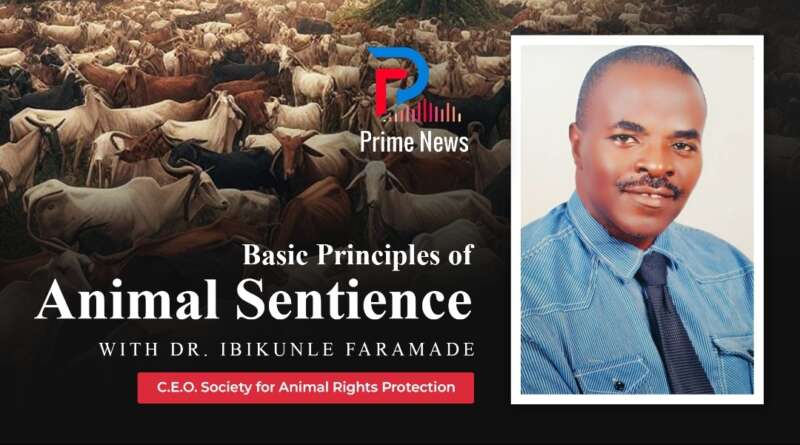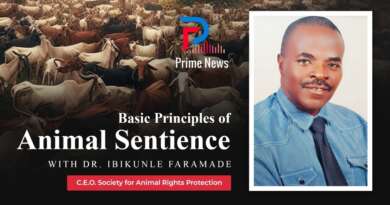The Third Freedom of Animal Welfare
By Dr Ibikunle Faramade
(Freedom from Pain, Injury and Diseases – by means of Prevention, Rapid Diagnosis and Treatment)
The Farm Animal Welfare Committee of the United Kingdom, also known as Brambel Committee on Animal Welfare, recognized five freedom of animal welfare which has become accepted globally. These include:
- Freedom from hunger and thirst – by ready access to water and a diet to maintain health and vigour.
- Freedom from discomfort – by providing an appropriate environment including shelter and a comfortable resting area.
- Freedom from pain, injury and disease – by prevention or rapid diagnosis and treatment.
- Freedom to express normal behaviour – by providing sufficient space, proper facilities and appropriate company of the animal’s own kind.
- Freedom from fear and distress – by ensuring conditions and treatment, which avoid mental suffering.
We shall concentrate on the third freedom, i.e. Freedom from pain, injury and disease (by prevention or rapid diagnosis and treatment) in this column today as it applies to small animals, particularly, dogs and cats.
It has been established that animals feel pain because vertebrate animals are sentient beings. They could also experience injury that could be caused by myriads of aetiologies leading to minor or major (at times life threatening) conditions. Animals could fall sick due to metabolic imbalances or as a result infections due to host – pathogen – environment relationship. They could even harbour diseases that could be transmitted to humans generally referred to as zoonoses.
Some animal diseases are vaccine preventable, some are not. As far as dogs and cats are concerned, rabies vaccine is important to prevent the disease in your pets and possible transmission to humans. The only way to achieve zero case of rabies in humans as envisioned by the sustainable development goal 3 is through vaccination of dogs. It is mandatory. Some States in Nigeria, like Oyo State, have enabling law compelling all dogs and cats owners to vaccinate their animals. It is the right of your dogs and cats to be protected against rabies. Vaccinate them now, if you have not.
The first dose is when your dogs and cats have attained the age of three months, then, annually, thereafter. Take note that the vaccination of your pets should be accompanied by certificate of vaccination, properly endorsed by a veterinarian. In case of litigation, if your dog accidentally bite someone, the law requires that you should produce a properly endorsed vaccination certificate with the display of the type of vaccine, date of vaccination, expiry date of the vaccine. This would guide the physician to determine the appropriate post exposure management protocol that he would follow.
Your dogs also have the right to be protected from another five major diseases that are also vaccine preventable, apart from rabies. It is usually referred to as pentavalent vaccine (5 in one vaccine) which protects against the following diseases; Distemper, Hepatitis, Leptospirosis, Parvoviral infection and Para influenza disease (DHLPP). The vaccine is administered at six weeks of age and a booster dose is given at eight weeks. After this second dose, dogs are given the vaccine once yearly.
Apart from this routine vaccinations, dogs and cats should be routinely checked by the veterinarian, at least once every three months. This would afford the animal to be routinely dewormed. Early detection of any disease could also be made possible by this means.
In addition, it is important to pay adequate attention to the challenges of ectoparasites, most of which are disease vectors. Ticks, Lice, Mites for example constitute veritable source of discomfort to your dogs and cats. There are many safe topical medicaments that could be applied by oneself to ensure that they do not harm our animals particularly and the owners by extension.
Dog kennels should be free from sharp edges that could cause injury or bodily harm to the dogs. In case of unavoidable injuries, such animals should be taken to the veterinary clinic/hospital for prompt medical attention. In terms of housing, dogs should be protected from environmental vagaries such as rain, excessive sun, high humidity etc. Specially designed comfortable crates or cat boxes used indoors also provide comfort for cats and miniature dogs in-doors. These would improve the livelihood and well-being of our companion animals.
In conclusion, adequate and balance diet is sine quan non to the good health of the animals. Efforts should be made to feed animals adequately so they could be healthy to live good life and also to boost the various support services that humanity derive from them.
Dr. Ibikunle Faramade is a veterinary pathologist, sustainable development practitioner, animal welfare advocate and a lecturer at the Federal College of Animal Health & Production Technology, Apata. Ibadan. He’s the C.E.O of the Society for Animal Rights Protection, a non-profit and a non-governmental organization dedicated to the promotion of animal welfare, animal rights and prevention of cruelty to animals. animalrightsprotection2020@gmail.com , +2348028305284ss




